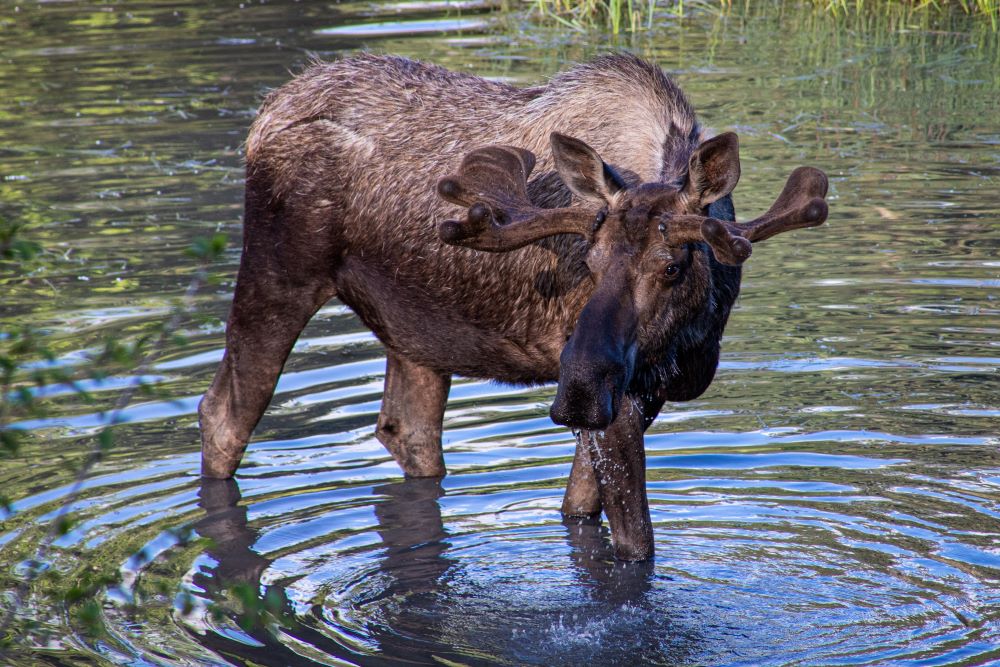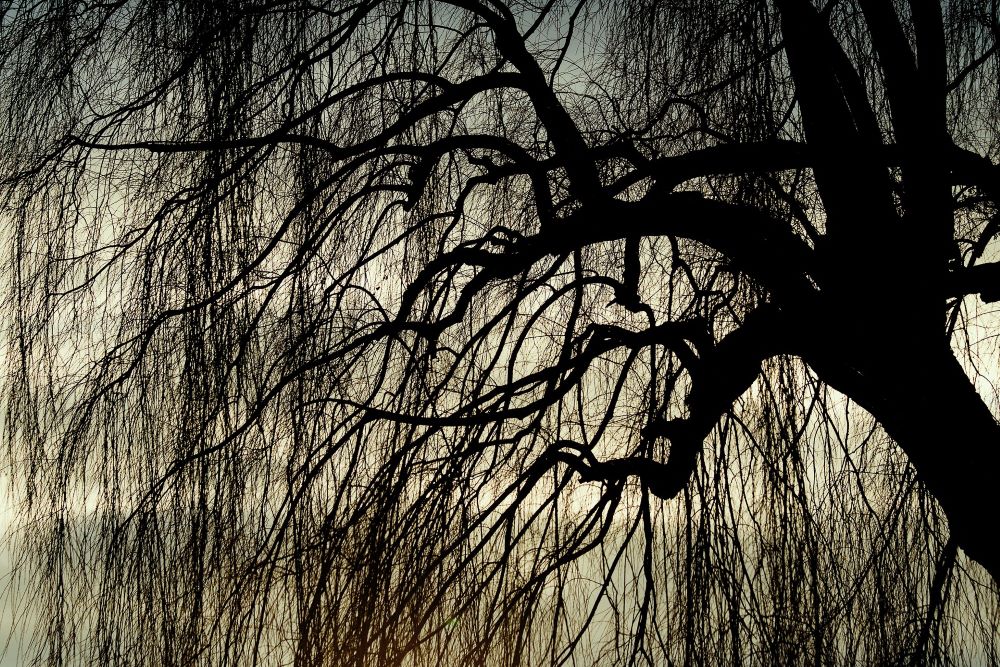
Moose rely on willow trees for up to 80% of their diet. The Willow drilling project in northern Alaska threatens natural habitats and Indigenous communities who depend on stable ecosystems and reliable Arctic ice for subsistence hunting. (Unsplash/John Thomas)
The ironies surrounding U.S. President Joe Biden's recent approval of the Willow drilling project in northern Alaska begin with its very name.
The willow tree thrives in Alaska. More than 50 species statewide provide a plethora of benefits. Native Alaskans have harvested the supple and durable willow for centuries for everything from shelter to medicine. Moose rely on willow trees for up to 80% of their diet. Cultures throughout the world have long believed that willow branches protect against evil and harm.
But harm now looms large for Alaska — and the world — with Biden's greenlighting of ConocoPhillips' gargantuan Willow drilling project.
Once completed, the site's three pads would be the largest complex of its kind on American public land, with the capacity to produce nearly 600 million barrels of oil over its projected 30-year lifespan. This total extraction would release nearly 280 million tons of greenhouse gasses, equal to roughly 2 million additional cars on U.S. roads in the same period. For reference, San Diego County in California has 2.2 million registered vehicles.
They are quite literally on thin ice with this project — yet ConocoPhillips claims it must act even more quickly because of the rapidly warming springs.
Biden approved this project in spite of his campaign proclamation of "no more drilling on federal lands, period." Biden was celebrated as America's first climate president when he built his administration on a promise to curb climate change, and tackle what he called an "existential threat to human existence as we know it." Yet on March 13, he authorized Willow, a fossil fuel project which, as The Guardian reported, "would comfortably wipe out the emissions saved from all renewable energy projects on US public lands by 2030."
This is just the latest in his legacy of broken promises to care for our common home. While he did sign the incredibly important Inflation Reduction Act, his administration opened an area more than twice the size of the Alaska project to leasing auctions for offshore oil and gas drilling in the Gulf of Mexico — mere weeks after approving the Willow Project.
A more terrifying irony is Willow's timing. We are in an era of crystal-clear scientific consensus, according to the latest report from the United Nations Intergovernmental Panel on Climate Change: All new fossil fuel projects must cease immediately, and emissions must plummet for us to have any chance of remaining within the 1.5 degrees Celsius (2.7 degrees Fahrenheit) of planetary warming set as a goal in the 2015 Paris Climate Agreement. Experts agree this limit is necessary to prevent more extreme effects of climate change and reduce the number of irreversible thresholds we pass.
ConocoPhillips plans to complete construction for the Alaska drilling site in eight years, in 2030-2031. During this time period, U.S. emissions must be halved (43-45%) in order to meet the limit. The year 2030 is also a key date to meet other global ecological targets, including benchmarks for increasing renewable energy and stopping deforestation. At the current rate of fossil fuel consumption, our remaining global carbon budget will run out in 2030 — precisely when Willow is projected to come online. The planet, and the people who live here, cannot afford it.
The Willow climate bomb also threatens Indigenous communities who depend on stable ecosystems and reliable Arctic ice for subsistence hunting. "Willow would permanently scar the largest undeveloped area in the United States, jeopardize the health and traditional practices of nearby Indigenous communities, and harm essential wildlife habitat for polar bears, migratory birds, caribou and other iconic species," the Center for Biological Diversity said in a statement. While the project would provide financial benefits in the near term to support Alaskan communities, it also would increase dependence upon unsustainable oil extraction. Furthermore, environmental experts and organizations like EarthJustice are quick to point out that threats to our collective health, economic, climate and psychological well-being in the not-so-distant future far outweigh any immediate boons.

More than 50 species of willow trees thrive in Alaska. The 30-year plan from ConocoPhillips to drill in sensitive Alaskan ecosystems and near Indigenous communities threatens the ecosystem. (Pixabay/minka2507)
Perhaps most ironic is that ConocoPhillips cannot construct Willow's drilling pads as usual because the melting permafrost endangers the infrastructure's stability. Executives of the Texas-based oil giant admitted it would have to refreeze the compromised permafrost below the platforms, as it is too soft to build on. They are quite literally on thin ice with this project — yet ConocoPhillips claims it must act even more quickly because of the rapidly warming springs, which narrow the window of time to construct and drill.
The pastoral process (see-judge-act) helps us to examine the realities of the world by taking time to see what is happening, discern with the light of our faith and then act accordingly.
In 2015, Pope Francis' landmark encyclical Laudato Si', "on Care for Our Common Home" entreated the entire world to pay attention to the dangers of continuing business as usual. In line with the soundest scientific recommendations, he stated with bold clarity, "We know that technology based on the use of highly polluting fossil fuels — especially coal, but also oil and, to a lesser degree, gas — needs to be progressively replaced without delay."
As powerful as his words were, the message was not new. In 1971, Pope Paul VI in his apostolic letter Ocogesima Adveniens was already entreating the entire church to wake up to the "dramatic and unexpected consequence of human activity," that due to "an ill-considered exploitation of nature he risks destroying it and becoming in his turn the victim of this degradation."
Biden's decision only escalates this menacing trajectory, recognized by the pope more than 50 years ago. We all stand to lose tremendously from further fossil fuel development that, in the words of Paul VI, is "creating an environment for tomorrow which may well be intolerable."
The messages from faith leadership are clear. As people united in faith who care for and love our common home, we too must be clear. Living our faith means standing in solidarity with our global siblings in staunchly opposing the fossil fuel infrastructure push that, horrifyingly, continues in this era of Code Red for our planet. We hear repeatedly in Laudato Si' that we are all interconnected, and this "obliges us to think of one world with a common plan." That plan must not — cannot — include more fossil fuel projects like Willow, or the leasing of our southern Gulf shores for extraction, or the East Africa Crude Oil Pipeline (EACOP), or fossil fuel projects anywhere else.
Advertisement
Laudato Si' animators, local leaders working on climate change action worldwide, are actively campaigning against EACOP in addition to opposing Willow. We fully support the Fossil Fuel Non-Proliferation Treaty, which complements and enhances the Paris Agreement and accelerates the "equitable shift away from fossil fuels to an affordable, abundant clean energy for all."
We face these many ironies with sincere, spirit-driven faithfulness to care for our common home.
As Francis says in Laudato Si', "Although the post-industrial period may well be remembered as one of the most irresponsible in history, nonetheless there is reason to hope that humanity at the dawn of the twenty-first century will be remembered for having generously shouldered its grave responsibilities."
There is a mechanism for Biden to reverse his decision on Willow if he hears from enough people. The window of opportunity is now: ConocoPhillips must wait until the fall to build because the spring's melting permafrost makes it currently unsafe.
There is time to act. There is time to call (202-456-1111) or send a personal message to the White House to express Catholic concern for our common home.







